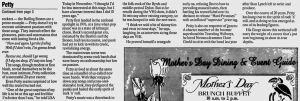Concert Preview: Petty returns to the musical basics
By Don Adair
The Spokesman-Review -- Friday, May 5, 1995
With the release of his latest CD, "Wildflowers," Tom Petty hit his creative stride.
"Wildflowers" belongs to that category of record in which the songs get down to their bare essence, exposing them to the world without the cover of big instrumentation, guest musicians or hot production techniques.
On "Wildflowers," Petty and producer Rick Rubin chose to use only natural instruments -- i.e. no synthesizers or computers -- and recorded in aging studios that they judged to have the most natural, least-synthetic sound quality.
He found old microphones and recording gear and incorporated such arcane instruments as harmoniums and Mellotrons.
Like Neil Young, Petty has developed a distrust of modern recording technology.
"I'd have to give it a D-plus. I think it's unhealthy for rock. I can hear digital anything; it sounds different."
"Wildflowers" is anything but cold; actually, it's Petty's warmest, more intimate record. In its (mostly) quiet way, its songs range widely, touching on country-blues, folk, and even country, with hints of California guitar-pop and psychedelia (check out "A Higher Place" for its delicious Roger McGuinn 12-string stylings).
And the characters on "Wildflowers" seem closer to Petty's heart than the archetypal figures from past work. Unlike other aging rockers -- the Rolling Stones are a prime example -- Petty doesn't try to recreate adolescent passions with these songs. They instead reflect the pleasures, pains and concessions that come with having lived a life.
"Now and again I get the feeling
Well if I don't win, I'm gonna break even
Rescue me, should I go wrong.
If I dig deep, if I stay too long."
These songs, though modest at first blush, reveal themselves to be the best, most intimate, Petty collection of a successful 20-year career.
Even Petty seemed surprised at how well the record turned out.
"One of the great surprises of my life is to be at this age and feel like I'm better than I was," he told USA Today in November. "I thought I'd be less interested at this stage, but I have a keener interest than I did 10 years ago."
Petty first landed in the national spotlight in 1976, at a time when pop music was in a stage of lethargic chaos. Rock's second great era, initiated by the Beatles and the Stones, had run its course, and punk had yet to kick in with its crude, revitalizing energy.
The mainstream scene was dominated by arena-rock bands that were heavy on craftsmanship but low on passion.
Petty arrived at about the same time as a handful of so-called new wave bands. With their stripped-down pop songs and jeans-and-skinnytie look, they prefigured the punks and hailed the early spirit of rock 'n' roll.
Petty's music was a throwback to the folk-rock of the Byrds and middle-period Dylan. But as he recalls during the VH1 show, it didn't fit into any other existing category, so he was lumped in with the new wave.
"I think we sold a lot of skinny ties and vests in those days," he says, laughing, in an interview airing these days on VH1.
He proved himself a renegade early on, refusing first to bow to prevailing musical tastes, then battling his record label over its decision to release "Hard Promises" with an inflated "superstar" price tag.
Petty is also no respecter of genres: A charter member of the boomer superband the Traveling Wilburys, he hired Nirvana drummer Dave Grohl to sit in with the band last year after Stan Lynch left to write and produce.
Over the course of 20 years, Petty has hung true to the spirit of rock 'n' roll, and in doing so has emerged as one of its leading figures.
His Gorge shows this weekend will carry the weight of a career that's just now beginning to show its tre depths.


